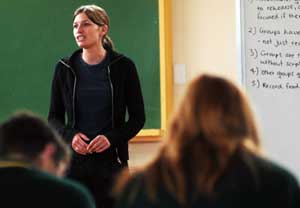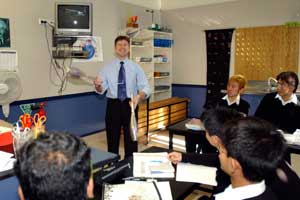Secondary School Teacher
Tasks & duties

Secondary school teachers may do some or all of the following:
-
plan, prepare and present teaching programmes
-
engage students in learning, responding to individual learning needs
-
set and mark assignments and tests
-
assess students' work for internally assessed components of qualifications
-
observe students' work, behaviour and attendance
-
keep records and write reports on students
-
manage student behaviour in the classroom
-
attend departmental and staff meetings
-
undertake pastoral care duties by supporting students with personal difficulties
-
meet with parents, whānau or caregivers, individually or at parents' evenings
-
be responsible for a form class
-
participate in or organise extra-curricular activities such as sport, camp or drama
-
keep up to date with curriculum changes and assessment methods
Skills & knowledge

Secondary school teachers need to have:
-
teaching skills, and knowledge of different teaching methods and learning styles
-
knowledge of the curriculum subjects they teach
-
curriculum assessment and planning skills
-
communication skills and the ability to relate well to students and adults
-
classroom management skills, including an understanding of behaviour management
-
knowledge of school rules and procedures including safety and emergency procedures
-
knowledge of how to access services that provide support and help to teachers
-
organisational and problem-solving skills
-
understanding of a range of cultures
-
computer skills
-
research skills
Entry requirements
To become a secondary school teacher you need to complete one of the following:
-
a specialist subject degree followed by a one-year Graduate Diploma of Teaching (Secondary)
-
a combined specialist subject degree and secondary teaching qualification
You will need to train to teach at least two curriculum areas, as this gives principals more flexibility with timetabling.
Targeted scholarships
Scholarships are offered by the Government to encourage people to become secondary school teachers in the shortage subject areas of chemistry, home economics, mathematics, physics, te reo Māori and technology.
Scholarships are also available to people from rural areas, and they are required to teach in rural secondary schools for a minimum of two years after completing the course.
New career changer scholarships are available to people wishing to retrain as a technology or te reo Māori teacher.
Secondary education
A tertiary entrance qualification is needed to enter university and teacher training.
Training on the job
Newly qualified teachers have a reduced workload and a special programme of support provided by their school for the first two years in the job.
Secondary school teachers are required to spend a certain number of hours training each year. This can be done through departmental courses, in-house training or external courses, workshops and seminars.
Registration
First year secondary school teachers must become provisionally registered with the New Zealand Teachers Council and will gain full registration after two years satisfactory work as a teacher. On becoming fully registered teachers are issued with a practising certificate.
Useful experience
Useful experience for secondary school teachers includes:
-
counselling
-
tutoring
-
coaching
-
working with people with disabilities
-
working as a youth group leader
-
working as a teacher aide
Related courses
Bilingual Early Childhood Teacher Training (Pre-Service)
Curriculum Studies
English Language
General Primary and Secondary Education
Mathematics
Teacher Education: Secondary (Pre-Service)
Teacher Professional Development
For more information, please refer to Career Services.
Document Actions
